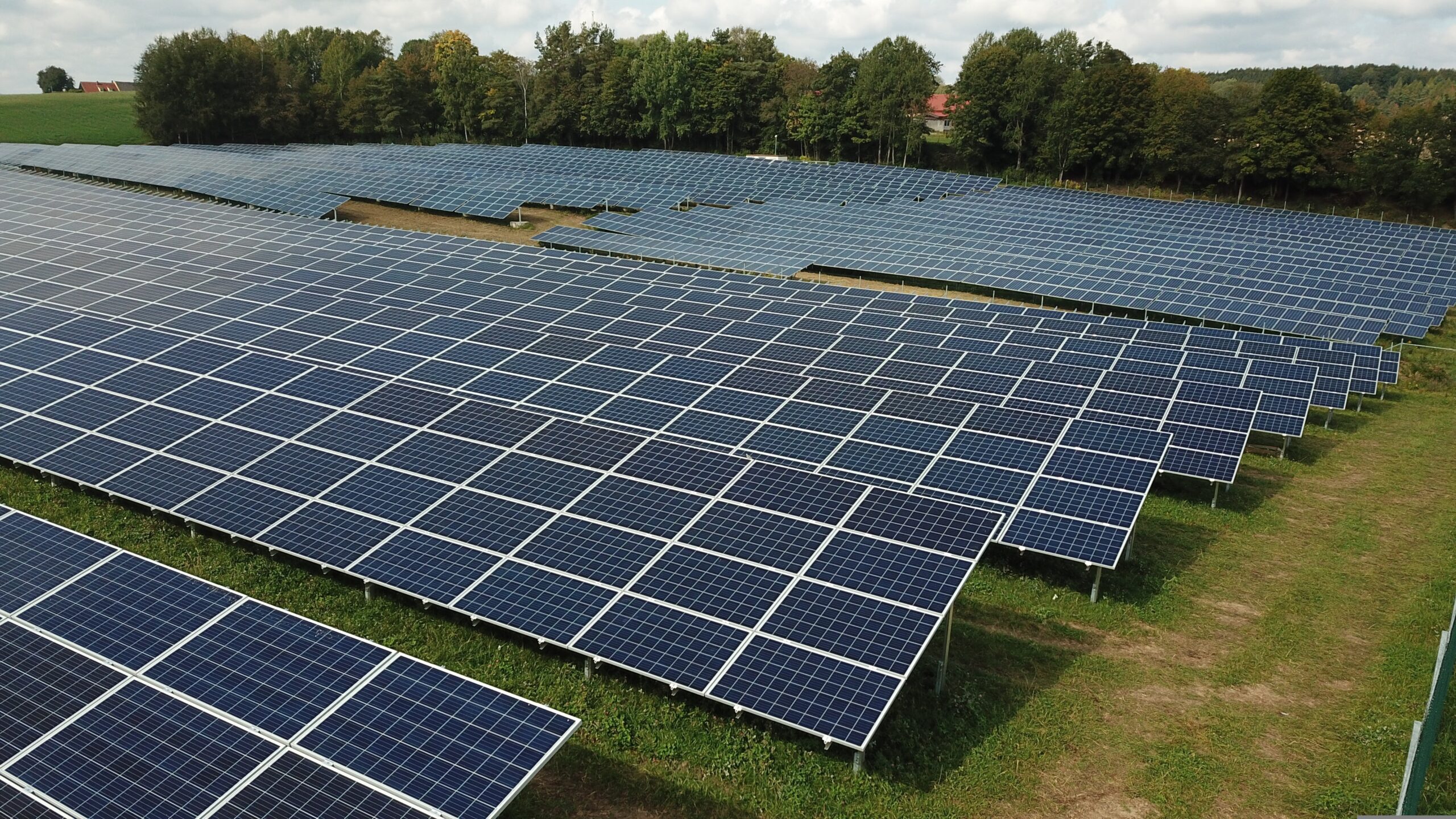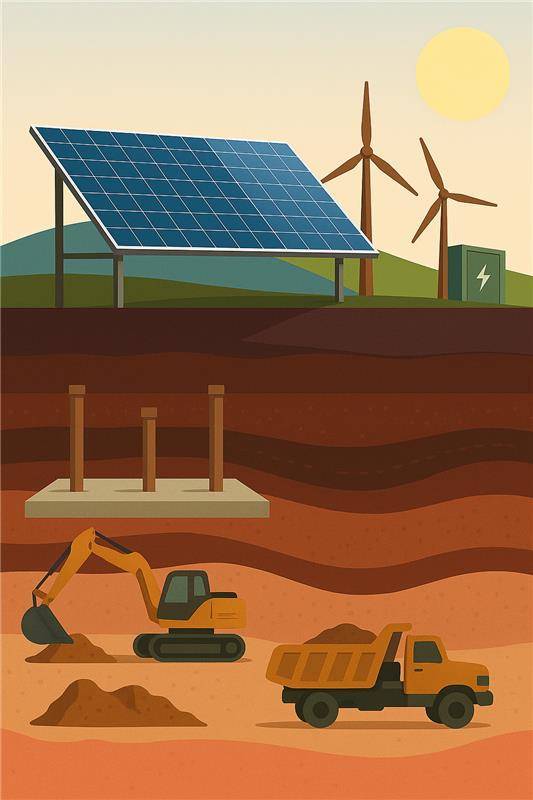When thinking about utility-scale solar PV projects, modules, trackers, and inverters come to mind first. While these modules, trackers, and inverters are integral components of PV systems, the real value in any solar PV project is beneath the ground – the soil and the foundations. For this reason, experienced Solar power plant Consultants in India often emphasise that geotechnical studies and foundation design are just as important as modules and inverters in determining long-term success.
In particular, site geotechnical conditions dictate what type of foundation system is appropriate, the expense of the foundation system, and the greatest efficiencies and productivity of the unit over the long term. Additionally, poor soil conditions, subsurface problems, or a foundation design error could delay and derail the project, if not result in catastrophic structural failure (total washing away of the structure).
At QQ Engineering & Consulting (QQEC), each project stands exclusively on this principle: smart soils equal smart foundations. Our network of geotechnical and civil engineers uses ideal methods along with years of experience to create efficient, economical, and sustainable foundation systems.
Why Foundations and Soil conditions are important for Solar Projects
Solar PV plants are designed to deliver 25 or more years of energy. In that time frame, it must endure the solar energy delivered, winds, rains, soil movement, and environmental transitions both above and below the surface for those 25+ years. While panels and trackers can always be swapped or fixed, the foundation that is under them must achieve settlement stability throughout the life of the project.
The performance of the foundation is a derivative of the soil under the foundation. Loose soils, expansive clay, bedrock, and slopes all present separate challenges that must be properly addressed. If not, the bottom-line risks may include misalignment of the tracker, settlement of the unit or an increase in maintenance.
For developers, this means decreased energy production and financial uncertainty. This is why civil engineering consultants in India are important to solar development; civil engineering consultants help to integrate structural engineering and geotechnical science into unique foundation systems, focusing on the site-specific conditions and requirements.
Sustainable Civil Engineering for Solar PV
Sustainability is hip, but it is also the goal. Investors, lenders, and governments demand thatRenewable Energy Consultants in India adhere to environmental and social governance (ESG) metrics. Civil engineering is front and centre for achieving those objectives.
At QQEC, we are focused on foundation systems that reduce materials employed while maintaining safety requirements. For example, soil tests may lead us to suggest reduced-depth pile installation, increased spacing of pile points, or a different foundation design that results in reduced steel use. In addition to saving money, this also lowers any carbon cost.
By aligning geotechnical and foundation design approaches with international sustainable standards, we assist Top Solar consultants in India, lenders, and investors in achieving performance and ESG goals. This reduces lenders’ long-term exposure and increases attractiveness to lenders.
Bridging the Gap Between Soil and Steel
Building a solar PV project is more than just connecting steel and silicon. It is connecting the science of the soil with the fortitude of engineering. At QQEC, we are at this intersection in our business.
We’ve supported projects at the gigawatt (GW) scale. All across the project life cycle, our engineers have been able to represent a bigger picture. We assess the soil and design foundational systems within our understanding of the civil engineering project drivers, climate variables and sustainability goals. This means our designs meet necessary engineering standards but are also economically competitive.
In fact, we use geotechnical modelling in areas with significant soil variability for development purposes, as we are able to provide site-specific prediction of performance due to actual environmental conditions and limitations associated with the soil structure. These forecasting capabilities allow developers to avoid issues during construction and ensure that retribution has not been a problem in the last few decades of operating their solar system.
How Smart Soil Analysis Saves Time and Money
Having soil evaluated and a geotechnical report may seem like a needless step at the beginning of a project, but it saves time and expenses either way. For example:
- Without soil testing, the developer may overdesign their foundations. In response depends on the variables that consume too much steel and concrete versus what is truly required. This only introduces unneeded upfront cost.
- At the other end, if you underestimate the soil cohesion, you could develop structural problems, which would require costly re-planning or repairs after installation, disrupting normal operations.
So getting the soil and foundational design right the first time, for the top-rated solar project consultants in India, helps developers to avoid a lot of potential pitfalls. Innovative analysis limits schedule delays, significant material expenses, and ultimately, public success on long-term performance.
Collaboration with Developers and Lenders
At QQEC, we are partners, not “consultants”. We collaborate with project developers, EPC contractors and owners to identify the scope and each foundation’s project. This collaborative process builds trust and confidence for our stakeholders throughout the financing phase.
For our owners’ engineering consultants in India, our engineers use independent and objective guidelines to ensure testing is science-based for decisions. Our engineers provide supporting evidence to investors that the solar system is structurally safe. This enables financing deals to start rolling in, and finally, the implementation of our project.
Promoting the Renewable Energy Goal
India and the world are on a grand mission towards clean energy. As solar PV projects grow, so does the demand for dependable, reliable civil engineering. Foundations are the least glamorous, yet very much the building block of performance, safety, and sustainability.
If the focus is on the soil and the foundations, we can help directly with the success of renewable energy. Solar power plant consultant in India, BESS engineering, or a detail engineering consultant – it does not matter. We tweak our services, but our goal is the same: to deliver safe, cost-effective, and future-ready solutions.
Building the Future from the Base
The renewable energy sector often talks about making strides in modules, batteries, or inverters. However, real advancements are happening below ground. Smarter soil testing, better geotechnical tests, and better foundation designs are changing the construction of solar PV projects.
At QQEC, we are excited to be part of this change. We take pride in the intersections of civil engineering and sustainability to provide foundations that support both solar panels and the cleaner, more sustainable energy future we all desire.
We invite developers, EPCs, operators, and investors to rethink foundations as the responsible energy future starts with you and starts from the ground up.
Frequently Asked Questions (FAQ)
Why are soil studies needed in solar PV projects?
Soil conditions will determine the type and size of the foundation. If you do not have an adequate analysis completed, the project may be at risk from issues like settlement, displaced trackers or unplanned costs.
How do foundation designs affect the cost of the project?
Foundations can be the majority of the civil cost in the solar project. Smart soil analyses will allow for a foundation that is not over-designed or under-designed, saving costs on materials and rework.
Why use QQEC for foundation engineering?
QQEC has gigawatt-level experience and knowledg,e and, with the knowledge of sustainability, supports the case for beneficial foundations.
To Conclude
Ultimately, the strength of a solar PV project does not rely on panels or inverters but on the soil. Foundations are the hidden strength that will hold solar farms stable and profitable for decades. At QQ Engineering & Consultant, we combine geotechnical and civil engineering knowledge to design smart, sustainable, and cost-effective foundations for solar. Let’s build a renewable energy system from the ground up that is built strong from the ground up.


